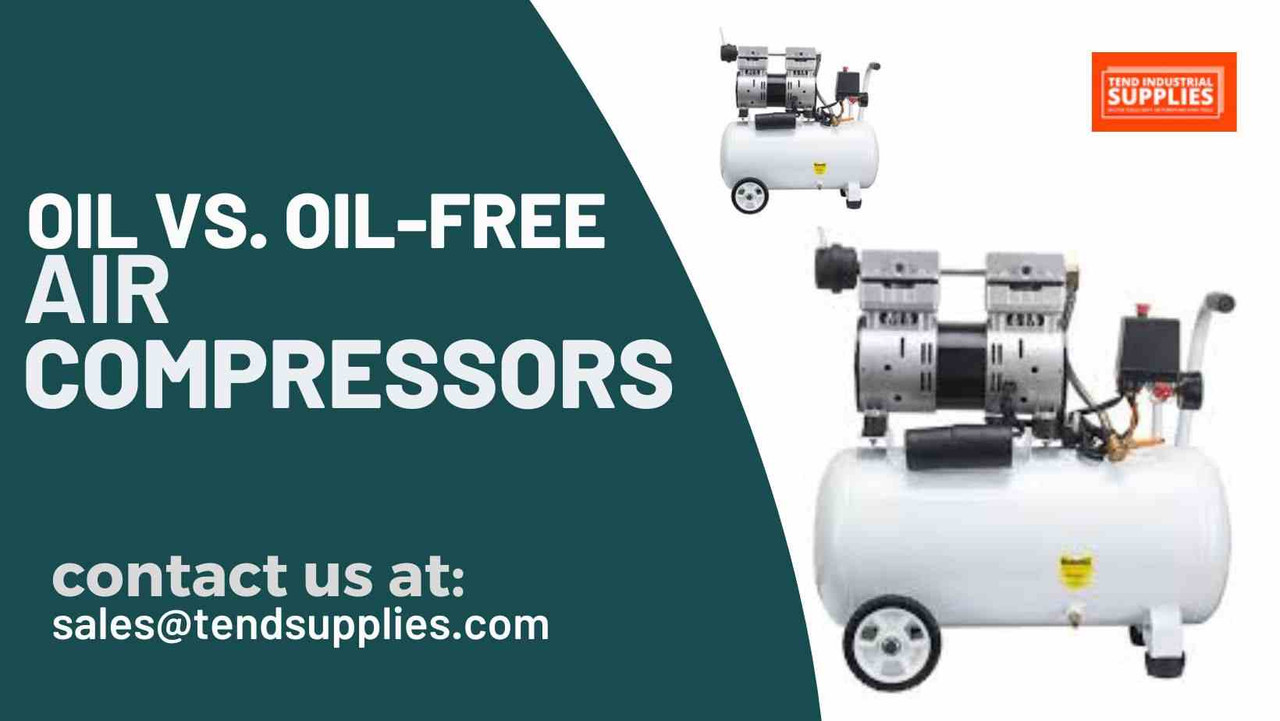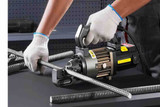Oil vs. Oil-Free Air Compressors
One of the most significant decisions when choosing an air compressor is whether to go with an oil-lubricated or oil-free model. Each type has advantages and disadvantages, depending on your needs and applications. This comprehensive guide will explore the differences between oil and oil-free air compressors, their benefits, and how to choose the right one for your requirements.
Key Takeaway
Choosing between an oil-lubricated and oil-free air compressor depends on your specific needs and applications. Oil-lubricated compressors offer durability, efficiency, and quieter operation, making them suitable for heavy-duty tasks. On the other hand, oil-free compressors provide a maintenance-free, portable, and clean air solution, ideal for light-duty and contamination-sensitive applications.
Understanding Oil and Oil-Free Air Compressors
Oil-Lubricated Air Compressors
Oil-lubricated air compressors, also known as oil-injected compressors, use oil to lubricate their moving parts. This lubrication reduces friction and wear, enhancing the compressor's lifespan and efficiency.
Advantages of Oil-Lubricated Air Compressors
- Durability: The oil helps to reduce friction and heat, resulting in longer-lasting components and overall durability.
- Efficiency: Oil-lubricated compressors are generally more efficient and can handle continuous, heavy-duty use.
- Quiet Operation: These compressors tend to be quieter due to the lubrication of internal parts.
Disadvantages of Oil-Lubricated Air Compressors
- Maintenance: They require regular oil changes and maintenance to ensure optimal performance.
- Weight: Typically heavier and less portable due to the additional components.
- Cost: Generally more expensive than oil-free models due to their construction and maintenance requirements.
Oil-Free Air Compressors
Oil-free air compressors, also known as oil-less compressors, use self-lubricating materials such as Teflon to reduce friction between moving parts. These compressors are designed for minimal maintenance and are often more portable.
Advantages of Oil-Free Air Compressors
- Low Maintenance: They require little to no maintenance since there's no need for oil changes.
- Portability: Often lighter and more compact, making them easier to transport and store.
- Cost: Usually cheaper upfront than oil-lubricated models.
- Clean Operation: This is ideal for applications where oil contamination must be avoided, such as food processing or medical industries.
Disadvantages of Oil-Free Air Compressors
- Durability: Tend to wear out faster than oil-lubricated compressors due to the need for continuous lubrication.
- Noise: Often noisier because they lack the dampening effect of oil.
- Limited Use: Not as suitable for heavy-duty, continuous use compared to their oil-lubricated counterparts.
Choosing Between Oil and Oil-Free Air Compressors
Consider Your Application
The first step in choosing between an oil and oil-free air compressor is to consider your specific application. Here are some common scenarios:
- Industrial Use: An oil-lubricated compressor is often the best choice for continuous, heavy-duty operations such as in factories or workshops due to its durability and efficiency.
- Portable Use: An oil-free model's lightweight and low-maintenance design is ideal if you need a compressor for occasional use or transport to different locations.
- Clean Applications: Oil-free compressors are preferred for applications requiring clean air, such as those in the food, pharmaceutical, or dental industries, to avoid oil contamination.
Evaluate Performance Requirements
Assess your performance requirements by considering the following factors:
- CFM (Cubic Feet per Minute) measures the compressor's airflow. Ensure the compressor meets or exceeds the airflow needs of your tools or applications.
- PSI (Pounds per Square Inch): This measures the compressor's pressure. Match the compressor's PSI rating to the requirements of your tools.
- Duty Cycle: Consider how often you'll be using the compressor. Oil-lubricated compressors are better suited for high-duty cycles, while oil-free models are suitable for intermittent use.
Budget and Maintenance
Your budget and willingness to perform maintenance also play a crucial role in your decision:
- Initial Cost: Oil-free compressors are generally cheaper upfront. However, consider the long-term costs associated with maintenance and potential replacements.
- Maintenance Commitment: Oil-free compressors are ideal if you prefer a low-maintenance option. An oil-lubricated compressor might be a better fit if you're comfortable with regular maintenance tasks like oil changes.
Benefits of Oil vs. Oil-Free Air Compressors
Oil-Lubricated Compressors
- Longevity and Durability: Oil's continuous lubrication reduces wear and tear, extending the compressor's life.
- Efficient Performance: Better suited for heavy-duty tasks and continuous operation, ensuring reliable performance under demanding conditions.
- Quieter Operation: The oil dampens noise, resulting in a quieter working environment.
Oil-Free Compressors
- Maintenance-Free: Ideal for users who want a hassle-free experience without the need for regular oil changes.
- Portable and Lightweight: Easier to move around, making them suitable for on-the-go projects.
- Clean Air Output: Essential for applications where air purity is critical, preventing oil contamination.
Frequently Asked Questions (FAQs)
1. What is the main difference between oil and oil-free air compressors?
The main difference is that oil air compressors use oil for lubrication, resulting in better durability and efficiency, while oil-free compressors use self-lubricating materials, making them low-maintenance and portable.
2. Which type of air compressor is quieter?
Oil-lubricated air compressors are generally quieter because the oil reduces friction and dampens noise.
3. Are oil-free air compressors suitable for industrial use?
Oil-free air compressors are typically not recommended for heavy-duty industrial use due to their lower durability and efficiency. They are better suited for intermittent, light-duty applications.
4. How often do I change the oil in an oil-lubricated air compressor?
The frequency of oil changes depends on the manufacturer's recommendations, but they are typically every 500-1000 hours of use. Regular oil changes ensure optimal performance and longevity.
5. Can oil-free air compressors be used in clean environments?
Yes, oil-free air compressors are ideal for clean environments, such as food processing or medical applications, where oil contamination must be avoided.
Call to Action
Need help choosing the right air compressor for your needs? VisitTend Industrial Supplies for a wide selection of oil and oil-free air compressors. If you have any questions or need assistance, please contact us at sales@tendsupplies.com. Get the perfect air compressor for your projects today!









